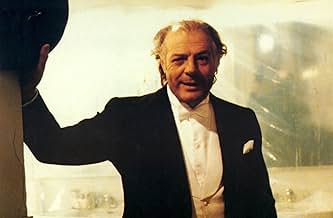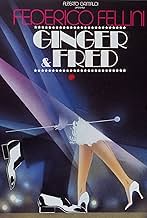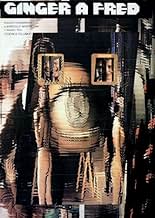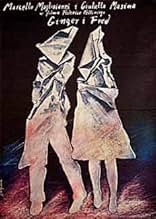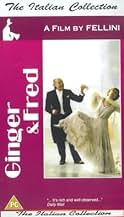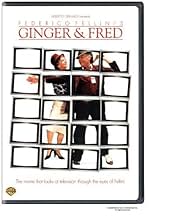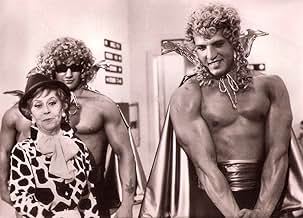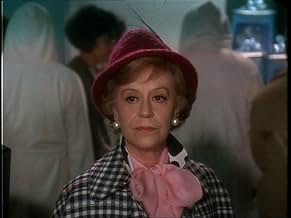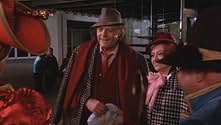IMDb RATING
7.2/10
5.7K
YOUR RATING
Amelia and Pippo are reunited after several decades to perform their old music-hall act on a TV variety show.Amelia and Pippo are reunited after several decades to perform their old music-hall act on a TV variety show.Amelia and Pippo are reunited after several decades to perform their old music-hall act on a TV variety show.
- Nominated for 1 BAFTA Award
- 18 wins & 18 nominations total
Friedrich von Ledebur
- Admiral Aulenti
- (as Frederick Ledebur)
Jacques Henri Lartigue
- Brother Gerolamo
- (as Jacques Henry Lartigue)
Totò Mignone
- Totò
- (as Toto Mignone)
Antoine Saint-John
- Bandaged man
- (as Antoine Saint Jean)
Friedrich von Thun
- Kidnapped Industrialist
- (as Frederich Thun)
Antonino Iuorio
- Production Inspector
- (as Antonio Iuorio)
Featured reviews
Fellini is perhaps the only director whose movies could never be adapted into books. The Maestro has invented a purely cinematic language to speak his own heart and tell his stories no matter how disjointed and anarchic they were for the discoverer, I guess his unique style would simply suffocate inside the restrictive format of words. Sure, drawings can give glimpses on his extravagant visions but still too static to convey the sense of fun and buoyancy he injects in his material. They could make interesting comic strips though but would they work the same without Nino Rota or Nicola Piavani's music?
Fellini movies are made for either the stage or the screen, their delights are essentially visual and musical, their enjoyment works on a sensitive and emotional rather than intellectual level. This is the old magic formula that made glorious days of Hollywood and Broadway, providing the kind of entertainment books and radio couldn't, that era immortalized by Chaplin, Laurel and Hardy, Walt Disney cartoons and of course musicals, and one of the most emblematic moments of that long gone period is Fred Astaire and Ginger Rogers dancing "Cheek to Cheek". That heavenly scene immortalized by countless homages, notably from "The Green Mile" and Woody Allen's "Purple Rose of Cairo".
Fellini's "Ginger and Fred" is impregnated with a similar dose of nostalgia although we never see the legends, we don't need their last names, we don't need the lyrics to remember "Top Hat", we don't need Giuletta Masina to look like Ginger Rogers and she doesn't even pretend to be a lookalike while Marcello Mastroianni isn't exactly the thin and slender Astaire type. Yet the two Hollywood stars bright through the sole passion of Amelia (Masina) and Pippo (Mastroianni). Listen to her describing the choreography or her days of glory during interviews or Pippo, in one of the film's most inspired scenes, explaining the origins of tap dancing. Their listeners aren't always captivated but we know they're not talking to them but to us movie lovers fascinated by these Last Mohicans of Hollywood Golden Age... Italian style.
The homage itself is pure Fellini style, any lesser director would have made this love letter to Hollywood a sort of solemn prosternation... watching "Ginger and Fred" made me realize how willing even good movies like "The Artist" or "La La Land" were to recreate the magic at the expense of their personal touch, sinning by moments of sentimental manipulation. "Ginger and Fred" is nostalgic all right, but it's exuberant and transgressive like any Fellini film. The director turns the couple into decoy protagonists in a crazy universe, an avalanche of debauchery that makes them totally outdated. Behind the nostalgia, there's a commentary on how far the art of entertainment went, becoming as decadent as his portrayal of Rome like in "Satyricon". Good directors flash the lost innocence before our eyes, Fellini focuses on the much groovier hell.
What is the place of a tap dancing couple in a world where TV and pop electronic music waters its audience with a keleidoscope of sex, games, ads and random images designed to ignite masses lowest instincts? When Amelia is approached by an unimpressed journalist and driven to the hotel before the studio representation, she is surrounded by so many characters her frailty is enhanced: has-been artists, lookalikes, impersonators, dwarves... what have they in common? They're just weird, bizarre-looking or entertaining in a non-traditional way. It's eerie how Fellini prophecized the reality shows and their exploitations of wannabe celebrities and pseudo artists treated like freaks. There's a scene where Amelia is asked whether she's married to Pippo, if she was, that would have interested the audience even more. There's no place anymore for genuine interest, people want to be shocked, dazzled, or surprised, it's a giant leap made in five decades.
Having a foot in each world and being a true ringmaster, Fellini reconciles these two schools of entertainment, allowing within that orgy of telegenic bizarreness a few breaks to Amelia and Pippo, I didn't mind these crazy vignettes as they're part of the Fellinian experience but sometimes they can be too exhausting and so I enjoyed these brief moments of truce where Amelia and Pippo shared a few memories. I loved their complicity all through their film and one of the masterstrokes was the blackout before the act, so we could breath a little and listen to them commenting the mess surrounding them. It's interesting to see that they're lucid about their status, but they are willing to give the audience what they want, for the sake of their art. For all its anarchical structure, carried by that catchy soundtrack, Fellini can't resist the temptation of sentimentalism and that's a wise choice, as he allows his two fetish actors to have a substantial role at the dawn of their career, he even recast Franco Fabrizi as the host show, he who starred in his early neo-realist films.
In its "final show before the curtain closes" undertones, "Ginger and Fred" reminded me of Chaplin's "Limelight". The film has its slower moments but it's surprisingly grabbing and never dull or boring, Amelia and Pippo gravitate around these bizarre figures of entertainments like a Greek chorus we can relate to. At the end, they become Ginger and Fred in our hearts. And the film ends as it started, but at night in a deserted train station, with the two actors paying the kind of goodbyes that resonate like poignant farewells. But at long as they saw each other, that mess was all worth it, and since there's no Fellini film without the "film in the film" element, at least Il Dottore gratified us with a last reunion with his fetish actors: Masina and Mastroianni ... if only for that, "Ginger and Fred" deserves to be watched and appreciated.
Fellini movies are made for either the stage or the screen, their delights are essentially visual and musical, their enjoyment works on a sensitive and emotional rather than intellectual level. This is the old magic formula that made glorious days of Hollywood and Broadway, providing the kind of entertainment books and radio couldn't, that era immortalized by Chaplin, Laurel and Hardy, Walt Disney cartoons and of course musicals, and one of the most emblematic moments of that long gone period is Fred Astaire and Ginger Rogers dancing "Cheek to Cheek". That heavenly scene immortalized by countless homages, notably from "The Green Mile" and Woody Allen's "Purple Rose of Cairo".
Fellini's "Ginger and Fred" is impregnated with a similar dose of nostalgia although we never see the legends, we don't need their last names, we don't need the lyrics to remember "Top Hat", we don't need Giuletta Masina to look like Ginger Rogers and she doesn't even pretend to be a lookalike while Marcello Mastroianni isn't exactly the thin and slender Astaire type. Yet the two Hollywood stars bright through the sole passion of Amelia (Masina) and Pippo (Mastroianni). Listen to her describing the choreography or her days of glory during interviews or Pippo, in one of the film's most inspired scenes, explaining the origins of tap dancing. Their listeners aren't always captivated but we know they're not talking to them but to us movie lovers fascinated by these Last Mohicans of Hollywood Golden Age... Italian style.
The homage itself is pure Fellini style, any lesser director would have made this love letter to Hollywood a sort of solemn prosternation... watching "Ginger and Fred" made me realize how willing even good movies like "The Artist" or "La La Land" were to recreate the magic at the expense of their personal touch, sinning by moments of sentimental manipulation. "Ginger and Fred" is nostalgic all right, but it's exuberant and transgressive like any Fellini film. The director turns the couple into decoy protagonists in a crazy universe, an avalanche of debauchery that makes them totally outdated. Behind the nostalgia, there's a commentary on how far the art of entertainment went, becoming as decadent as his portrayal of Rome like in "Satyricon". Good directors flash the lost innocence before our eyes, Fellini focuses on the much groovier hell.
What is the place of a tap dancing couple in a world where TV and pop electronic music waters its audience with a keleidoscope of sex, games, ads and random images designed to ignite masses lowest instincts? When Amelia is approached by an unimpressed journalist and driven to the hotel before the studio representation, she is surrounded by so many characters her frailty is enhanced: has-been artists, lookalikes, impersonators, dwarves... what have they in common? They're just weird, bizarre-looking or entertaining in a non-traditional way. It's eerie how Fellini prophecized the reality shows and their exploitations of wannabe celebrities and pseudo artists treated like freaks. There's a scene where Amelia is asked whether she's married to Pippo, if she was, that would have interested the audience even more. There's no place anymore for genuine interest, people want to be shocked, dazzled, or surprised, it's a giant leap made in five decades.
Having a foot in each world and being a true ringmaster, Fellini reconciles these two schools of entertainment, allowing within that orgy of telegenic bizarreness a few breaks to Amelia and Pippo, I didn't mind these crazy vignettes as they're part of the Fellinian experience but sometimes they can be too exhausting and so I enjoyed these brief moments of truce where Amelia and Pippo shared a few memories. I loved their complicity all through their film and one of the masterstrokes was the blackout before the act, so we could breath a little and listen to them commenting the mess surrounding them. It's interesting to see that they're lucid about their status, but they are willing to give the audience what they want, for the sake of their art. For all its anarchical structure, carried by that catchy soundtrack, Fellini can't resist the temptation of sentimentalism and that's a wise choice, as he allows his two fetish actors to have a substantial role at the dawn of their career, he even recast Franco Fabrizi as the host show, he who starred in his early neo-realist films.
In its "final show before the curtain closes" undertones, "Ginger and Fred" reminded me of Chaplin's "Limelight". The film has its slower moments but it's surprisingly grabbing and never dull or boring, Amelia and Pippo gravitate around these bizarre figures of entertainments like a Greek chorus we can relate to. At the end, they become Ginger and Fred in our hearts. And the film ends as it started, but at night in a deserted train station, with the two actors paying the kind of goodbyes that resonate like poignant farewells. But at long as they saw each other, that mess was all worth it, and since there's no Fellini film without the "film in the film" element, at least Il Dottore gratified us with a last reunion with his fetish actors: Masina and Mastroianni ... if only for that, "Ginger and Fred" deserves to be watched and appreciated.
This wasn't a bad film, though those without previous knowledge of Fellini's films may not like it as much. Giuletta Masina and Marcello Mastroani give their usual great performances. I actually thought Marcello gave one of his better performances here, in that he displayed a great comedic timing. I am mostly familiar with Fellini's pre-1970 films so I was not sure how a film made in the 1980's would do (given how much cinema had changed from the 50's/60's to the 80's), but he still delivers an enjoyable film, thanks in large part to good acting by the two leads. I enjoyed the satirical attack on television and the modern era (advertisting, etc.), which I happen to strongly agree with. The TV show scene near the end contains your typical Fellini "magic" and aesthetics, so I enjoyed that as well. This is by no means comparable to Fellini's masterpieces, but is still a well-made and enjoyable film, and more accessible than some of his more outrageous stuff he's made in past years. 7/10.
I think this is the last great Federico Fellini picture. Maybe it's not as classic as "I vitelloni", "La strada", "Le notti di Cabiria", "La dolce vita", "Otto e mezzo" and "Amarcord", but it's a return to a more comedy style and it's one of the most accessible works of the Maestro as well.
"Ginger e Fred" (1985) comes after a series of more experimental films from Fellini. In this satirical comedy about TV power, a couple of old dancers reunite for a Christmas show. They enter a world where everything is taken for making audience, the two and their art are just caricatures... But who cares? The only important thing is audience.
In this feature Fellini warns about TV dangers -in a very sarcastic way he anticipates what TV is today with all these Reality shows.
The film is a typical Fellini picture -the story has not a real plot, it's a voyage where strange people (also in a physical way!) meet, we always can find exaggerated and ambiguous situations...
At the same time there's a lot of tenderness between the two dancers, superbly played by Marcello Mastroianni (who starred in several Fellini works) and Giulietta Masina (the actual Fellini's wife). It's useless to say that the chemistry between the two main actors is rally great.
It's quite a nostalgic movie -it seems that Fellini looks back and thinks about a world in which fantasy and creativity could be expressed in a better way, whereas TV kills everything.
The two subsequent films of the Italian director ("Intervista" and "La voce della luna") are rather minor -although poetic they're not as fresh and simple as "Ginger e Fred".
We miss Federico, Giulietta and Marcello.
"Ginger e Fred" (1985) comes after a series of more experimental films from Fellini. In this satirical comedy about TV power, a couple of old dancers reunite for a Christmas show. They enter a world where everything is taken for making audience, the two and their art are just caricatures... But who cares? The only important thing is audience.
In this feature Fellini warns about TV dangers -in a very sarcastic way he anticipates what TV is today with all these Reality shows.
The film is a typical Fellini picture -the story has not a real plot, it's a voyage where strange people (also in a physical way!) meet, we always can find exaggerated and ambiguous situations...
At the same time there's a lot of tenderness between the two dancers, superbly played by Marcello Mastroianni (who starred in several Fellini works) and Giulietta Masina (the actual Fellini's wife). It's useless to say that the chemistry between the two main actors is rally great.
It's quite a nostalgic movie -it seems that Fellini looks back and thinks about a world in which fantasy and creativity could be expressed in a better way, whereas TV kills everything.
The two subsequent films of the Italian director ("Intervista" and "La voce della luna") are rather minor -although poetic they're not as fresh and simple as "Ginger e Fred".
We miss Federico, Giulietta and Marcello.
Marcello Mastroianni and Giulietta Masina star in "Ginger and Fred" from 1986, directed by Federico Fellini.
Amelia and Pippo once had a successful act imitating Fred and Ginger. Thirty years after their act, they are asked to dance in a special Christmas show for TV called "We Are Proud To Present."
It's a real freak show with the most bizarre acts you've ever seen, including a priest who left the priesthood and is now engaged, a man of the cloth who can levitate himself, lookalikes - some very strange acts.
Amelia and Pippo not only danced together but were involved. However Amelia married, had a daughter and is now widowed. Pippo married as well.
Amelia is worried that Pippo isn't up to the dancing, and when the power goes out in the theater, the two consider bolting.
Bittersweet film with marvelous acting and real chemistry between the two.
Masina was married to Fellini and died five months after he did.
Amelia and Pippo once had a successful act imitating Fred and Ginger. Thirty years after their act, they are asked to dance in a special Christmas show for TV called "We Are Proud To Present."
It's a real freak show with the most bizarre acts you've ever seen, including a priest who left the priesthood and is now engaged, a man of the cloth who can levitate himself, lookalikes - some very strange acts.
Amelia and Pippo not only danced together but were involved. However Amelia married, had a daughter and is now widowed. Pippo married as well.
Amelia is worried that Pippo isn't up to the dancing, and when the power goes out in the theater, the two consider bolting.
Bittersweet film with marvelous acting and real chemistry between the two.
Masina was married to Fellini and died five months after he did.
Ginger e Fred (1986) is one of the few movies (4 in all) Fellini made in the '80s,and the ripest fruit of his late career,the acme of his narrative cinema.(In the 7th decade of the 20th century,Fellini also made relatively few films:only 4,and also 2 sketches.)Is "Ginger ..." Fellini's best movie?I don't know that;but it certainly is the one that I cherish most.Exquisite, unobjectionable, unparalleled cinema? Surely!Within the Fellini criteria,this is a rather simple movie,deprived of experiments,etc.;it is,of course,of no avail to be "told",but not because it lacks a "story",only that it is a simple,uneventful one.A sudden return to what we may call a perennial realism,of a perfect incision and a welcome sobriety of means,a huge appetite for giving an objective and transitive creation (though the resources of grotesque,tenderness,comic,Oneiric ,a detached Inebriety,satire,effects of strange,caricatures,etc.,are also used).It is also a return to a narrative form,and a very comic movie:in this film,Fellini has a content to be told,to be molded and put in an epic shape.The weird people could not miss,on the contrary;but the movie has an obvious realistic aim,in a comical,satirical and tender key.As shape,it is not an essay,but a realist narration,and each thing,though caricatured,is plausible.I would say that Fellini has,in "Ginger ...",so firm a notion on what he wants to say,that he can afford himself to be playful.He can afford it,as the main aim of his movie is so firmly handled.He had some things to say about love,life,old age,career,art,TV,contemporary life,etc.,some very straight things.For this movie,he chosen to deepen in the contemporary world;moreover,here he has not anymore that sense of tearing,of speechless pained,exasperated sensibility that gave a very special note to his '50s movies.A shivering,a feverishness.Mrs. Masina,in her room,looking outside:she sees a Martian landscape.
Throughout his 50 years career,Fellini made some TV creations (such as The Clowns and A Director's Notebook).In "Ginger ...",he expresses all his disgust for that institution,in a very acid charge.Is Fellini ever "non-judgmental", as some would like to believe?Never.
Mastroianni,with his whistles,and licentious jokes,and bad language,and courtesy.Fellini always allowed his actors to be great,to do THEIR creations,he never used them as mere puppets.Must I praise here Mastroianni's perfect mastery of his profession,his exquisite and tasty professionalism,in the noblest sense of this banal word?Fellini was a too generous, too intelligent director,not to let,and not to encourage Mastroianni be himself and give his best.Hence ,Mastroianni's "Pippo" is a whole chapter in the acting's history.(Hitchcock was not content with Clift,and I don't think he was with Newman;Antonioni was not content with Harris.Well,Fellini seemed to like the actors with strong personalities:he had in his movies Mastroianni,Anthony Quinn, Basehart, Broderick Crawford,Sordi,Terence Stamp,Anouk Aimée,François Périer, etc.,etc.!He never disliked or avoided to work with the great actors;this is a sign of his abundant and good-humored endowment,able to engross others' aptitude for creation .With Fellini,the actor's dignity is safe,and restored,the actor is allowed to display his endowment and work,his creation is sustained by the director.)In "Ginger ...",as in some other shows he did as an oldster,Mastroianni finds that exactness,that roundness,that plenitude,that sureness,that pleasantness,that made him maybe the most sure-footed actor.In his youth and maturity,Mastroianni's force came from his dexterity,intrepidity,etc.;now,there is this sheer artistic robustness.
Watch Mastroianni and Mrs. Masina,to see for yourself how far,how deep the actors' art can go.
Throughout his 50 years career,Fellini made some TV creations (such as The Clowns and A Director's Notebook).In "Ginger ...",he expresses all his disgust for that institution,in a very acid charge.Is Fellini ever "non-judgmental", as some would like to believe?Never.
Mastroianni,with his whistles,and licentious jokes,and bad language,and courtesy.Fellini always allowed his actors to be great,to do THEIR creations,he never used them as mere puppets.Must I praise here Mastroianni's perfect mastery of his profession,his exquisite and tasty professionalism,in the noblest sense of this banal word?Fellini was a too generous, too intelligent director,not to let,and not to encourage Mastroianni be himself and give his best.Hence ,Mastroianni's "Pippo" is a whole chapter in the acting's history.(Hitchcock was not content with Clift,and I don't think he was with Newman;Antonioni was not content with Harris.Well,Fellini seemed to like the actors with strong personalities:he had in his movies Mastroianni,Anthony Quinn, Basehart, Broderick Crawford,Sordi,Terence Stamp,Anouk Aimée,François Périer, etc.,etc.!He never disliked or avoided to work with the great actors;this is a sign of his abundant and good-humored endowment,able to engross others' aptitude for creation .With Fellini,the actor's dignity is safe,and restored,the actor is allowed to display his endowment and work,his creation is sustained by the director.)In "Ginger ...",as in some other shows he did as an oldster,Mastroianni finds that exactness,that roundness,that plenitude,that sureness,that pleasantness,that made him maybe the most sure-footed actor.In his youth and maturity,Mastroianni's force came from his dexterity,intrepidity,etc.;now,there is this sheer artistic robustness.
Watch Mastroianni and Mrs. Masina,to see for yourself how far,how deep the actors' art can go.
Storyline
Did you know
- TriviaUpon the film's release in the USA, Ginger Rogers sued the production and the distributors for 'misappropriation and infringement of her public personality'. The case was dismissed, the judgment stating that the film referred to her and Fred Astaire only obliquely.
- Quotes
Pippo Botticella: Unquestionably, we descend from the apes. The trouble is we can't get back to them, to their gift of instinct, of natural innocence.
- ConnectionsFeatured in At the Movies: The Money Pit/Ginger and Fred (1986)
- How long is Ginger & Fred?Powered by Alexa
Details
- Release date
- Countries of origin
- Languages
- Also known as
- Ginger and Fred
- Filming locations
- Production companies
- See more company credits at IMDbPro
Box office
- Gross US & Canada
- $837,623
- Opening weekend US & Canada
- $22,725
- Mar 30, 1986
- Gross worldwide
- $837,953
Contribute to this page
Suggest an edit or add missing content



